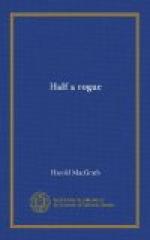The city of Herculaneum (so called in honor of one Hercules) was very well named. To become immortal it had the same number of tasks to perform as had old Hercules. The Augean Stables were in the City Hall; and had Hercules lived in Herculaneum, he never would have sat with the gods. The city lay in a pleasant valley, embraced by imposing wooded hills. There was plenty of water about, a lake, a river, a creek; none of these, however, was navigable for commercial purposes. But this in nowise hindered the city’s progress. On the tranquil bosom of the Erie Canal rode the graceful barges of commerce straight and slowly through the very heart of the town. Like its historic namesake, the city lived under the eternal shadow of smoke, barring Sundays; but its origin was not volcanic, only bituminous. True, year in and year out the streets were torn up, presenting an aspect not unlike the lava-beds of Vesuvius; but as this phase always implies, not destruction, but construction, murmurs were only local and few. It was a prosperous and busy city. It grew, it grows, and will grow. Long life to it! Every year the city directory points with pride to its growing bulk. A hundred thousand people; and, as Max O’Rell said—“All alive and kicking!” Herculaneum held its neighbors in hearty contempt, like the youth who has suddenly found his man’s strength, and parades round with a chip on his shoulder.
Three railroad lines ran through the business section, bisecting the principal thoroughfares. The passenger trains went along swiftly enough, but often freights of almost interminable length drawled through the squares. I say drawled advisedly. Surely the whuff-whuff of the engine seems to me a kind of mechanical speech; and to this was often added the sad lowing of cattle. From time to time some earnest but misdirected young man would join the aldermanic body, and immediately lift up his voice in protest. It was outrageous, and so forth; the railroads must be brought to their senses, and so forth. Presently a meeting would come and go without his voice being heard, another, and yet another. By and by he would silently cast his vote for the various businesses under hand, and go home. The old-timers would smile. They understood. They rode on annuals themselves.




